Joe Don Rooney talks guitars, EDM-country and Rascal Flatts' new album, Rewind
"We're trying to grow in a direction that's going to broaden the variety that exists already"
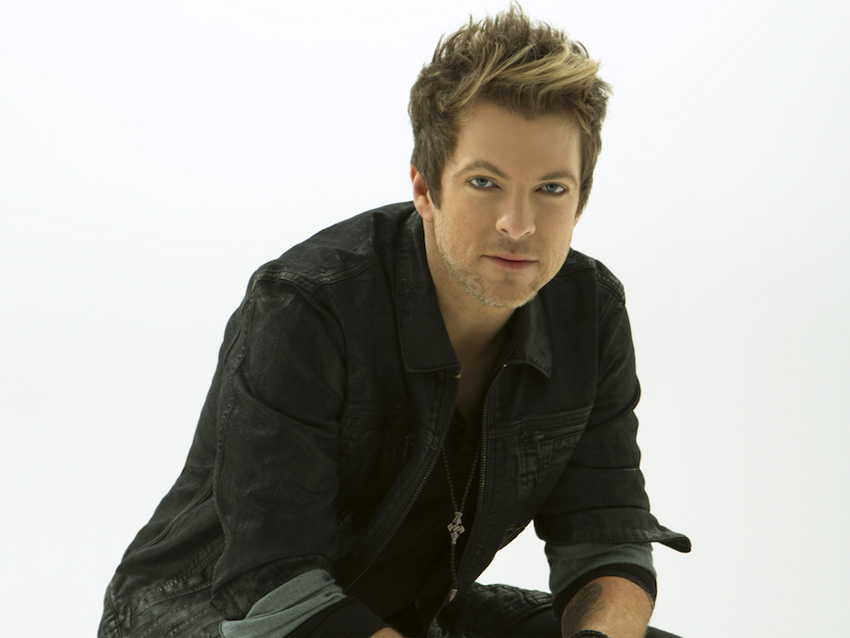
Joe Don Rooney talks guitars, EDM-country and Rascal Flatts' new album, Rewind
Now, I’m not saying Joe Don Rooney comes off as smug – that’s not an acceptable attitude for a performer to have in the economy of country megastardom – but he sure sounds happy to be exactly where he is, doing exactly what he’s doing. He is, after all, the lead guitarist/singer in a trio (Rascal Flatts) in a format (mainstream country) that isn’t opposed to spotlighting hooky guitar licks. “Other than country radio,” he points out, “there’s no other format, really, where you can hear some great guitar playing. It’s like everything’s so digitized and synthesized right now.”
The wistful, loop-laced title cut off of Rascal Flatts’ latest album, Rewind, is currently climbing the Billboard country charts, and the insistent thump of tracks like DJ Tonight and Powerful Stuff confirms that the group had EDM on the brain. That’s a brand-new influence for a band – rounded out by formidable frontman Gary LeVox and bassist/singer Jay DeMarcus – that’s been incorporating rock and pop flavors into its toothsome sound throughout its decade-and-a-half-long recording career.
It’s a welcome new challenge for Rooney, who grew up in Pitcher, Oklahoma, pledging allegiance to both honky-tonk and alternative rock with his sea foam green Telecaster, and put in time in regional country bands and family theaters, before landing his first Nashville job with Chely Wright, who was also employing DeMarcus, and sitting in with DeMarcus and his cousin LeVox at a bar gig one night. That was where it all started, and Rooney has plenty to say about what’s happened since.
(You can purchase Rascal Flatts' new album, Rewind, at iTunes. For tour dates, visit the official Rascal Flatts website.)
I gather that the amount of time you spent on this album – more time than the eight you’d made previously – had to do with you reinventing yourselves as a band. Now that you’re nearly a decade and a half into your recording career and have a track record of phenomenal success at both country and pop radio, what dod you feel like was at stake? What did that process of creative reinvention look like?
“That’s definitely something that we were thinking about going into the studio. We sat down with [label boss] Scott Borchetta at Big Machine back in late 2012 and said, ‘We want to make another album.’ And he was like, ‘Let’s do this the right way. I want you guys to take your time.’ We literally got a white board out and started writing some producers names down and started checking ‘em off the list one by one until we came up with a couple of producers we might want to work with that we’d never done work with in the past. And Howard Benson was one of those producers. Actually, Scott Borchetta had thrown his name in the hat.
“Howard brought that rock background to the table, because that’s all he’s ever done. He’s never tried to do anything in the country music world, and we never tried to go to a rock producer. So it was a little bit of working with no safety net, and it was fun. I think the cool thing was, Howard comes from a different place – his ears are different. So we love what he brought to the dance, the different songs.
"A lot of the demos we were [listening to] were just straight, bare-bones rock ‘n’ roll. I mean, pretty aggressive demos. It was pretty cool, because normally in Nashville when people are pitching songs to us, a lot of these writers nowadays try to make their demos sound like a Rascal Flatts record. And that’s totally fine. What we wanted to do was get out of that mode, and Howard was the first one to get us into that new mode."
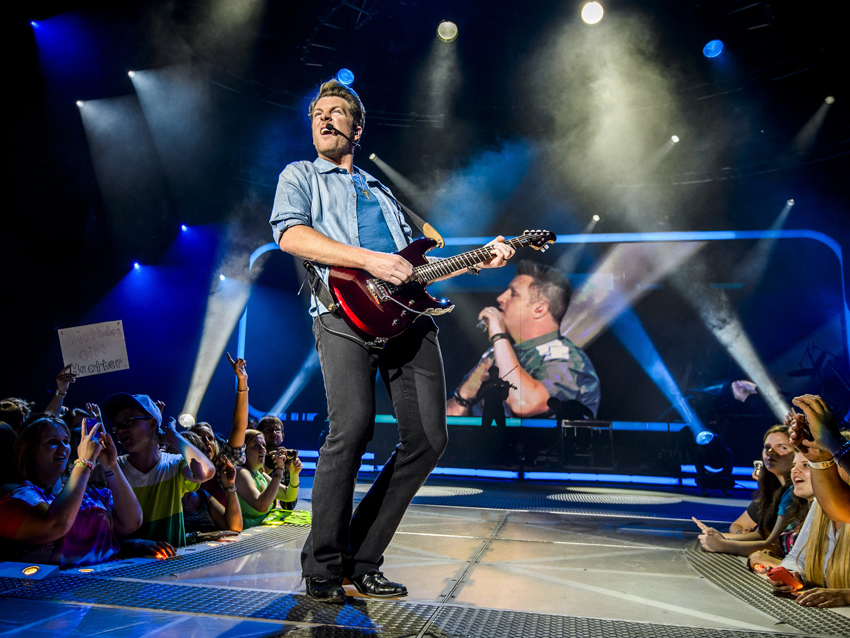
New sounds in country
“We probably cut 10 songs with Howard that we absolutely loved. I think six of those have made the project. We also worked with [longtime Flatts producer] Dann Huff. Two of those songs we worked with Dann on made the album. And then also along the way we had a meeting with Scott, and we asked him if it was OK if we went in to Jay’s studio and just worked on some songs by ourselves. He was totally for it. We were thrilled to get the opportunity to produce some tracks of our own on our own. That’s something we’d never done before. It was fun to camp out at Jay’s home studio. We probably listened to hundreds of songs just ourselves, trying to find the right ones to go in and record.
“There’s some old Rascal Flatts-esque style to the song Rewind, to the production and the delivery of it, but there’s some newness to it as well. Some of the guitar tones I went with are a little different. I think the way that Gary recorded his vocal is a little different. He used a different mic and a different compressor setup. Also, I doubled Gary’s lead vocal on a majority of the song. It gives it a whole different texture, and it’s something we’ve never done before. Lyrically, it’s something that we’ve never said before.
“I think we approached the recording process, over the last year and a half, a lot differently. We wanted to record old-style, with all the players and musicians in a room together, and not so many this time. There was just three or four. Some of the tracking sessions we used to do back in the day, I mean, you’d have a keyboard player and you’d have a loop guy going, you’d have a multi-instrumentalist maybe playing acoustic or mandolin, another electric guitar player and myself, Jay and obviously a drummer. And there might be two other guys playing other parts, as well. It became an orchestra, and we wanted to trim it back, a little more simplified.”
You’re describing technical and textural components that were different his time around. Besides the fact that you cut more party songs, the biggest change, to my ears, is that you’re incorporating dance music on some of these tracks. What difference did that make to how you conceived of and executed your parts?
“What happened in the recording process was that Scott Borchetta told us, ‘Be cognizant of radio. Just listen. Don’t be afraid to listen to a bunch of different stuff, even if you don’t like it. Just try to get your finger on the pulse of what’s happening right now.’ And he didn’t mean just specifically country music – he meant all music. And I’m so glad he said that, because that EDM movement is so huge right now, and there’s some of that stuff I really, really enjoy.
"I think it’s great, the four-on-the-floor kinda disco beat thing. I see why young kids are into it. You see the success of Avicii with Dan Tyminski crossing over to country music. Who would have dreamed that a tried-and-true EDM DJ would be on country radio? And that’s just what country is today – it’s very open, very broad. I love the fact that it’s so broad.”
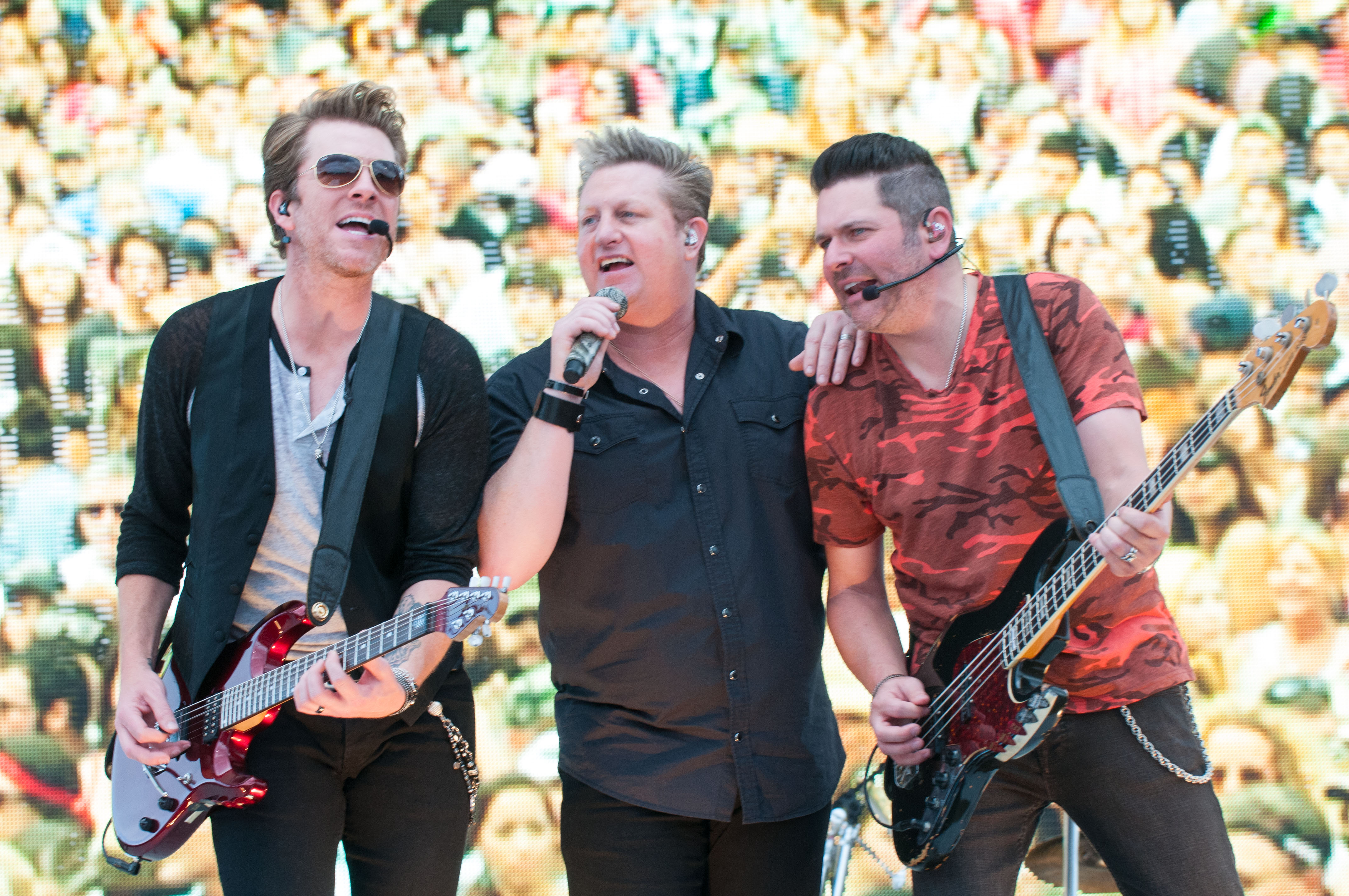
Some of his faves
Photo: Rooney (left) on stage with Gary LeVox and Jay DeMarcus, Florida, 2014.
From what I’ve read, the time and place that you grew up in – 1980s small-town Oklahoma – you were perfectly positioned between country and rock, with your dad’s weekend warrior country band and your high school rock band, so blending country and rock was second nature to you. How have you adjusted to the hybrid of country and EDM?
“Growing up in my small town of Pitcher, Oklahoma, it’s like I had friends that loved rock ‘n’ roll. They loved Nirvana, Pearl Jam, Metallica, as I did too. But they weren’t really into George Strait. They weren’t into Vince Gill. They weren’t into listening to old Merle Haggard records and hearing Roy Nichols play guitar parts. I loved it all… I had so much fun playing both sides of the fence. For me, it’s amazing to me to see that country music is basically all of that in a nutshell now. I love it so much, because my heart’s always been shaped that way.
“Kesha [and Pitbull] has a song called Timber that was just out and was a big hit. Dr. Luke did that track. It’s brilliant, because he [sampled] an old song that was called San Francisco Bay. If you go back and listen to that record, it’s an old harmonica part. They took the sound of that, sampled it, and they put it into this song with this different beat and sped it up. It’s like, ‘Holy shit. Now you’ve got something that’s incredibly fresh.’ A song like that could be played on country radio. That’s just fascinating to me.
“Rascal Flatts was the perfect foundation to grow and evolve my love for all kinds of music. There’s a lot of variety in Rascal Flatts, and again, we’re trying to grow in a direction that’s going to broaden the variety that exists already.”
On certain tracks you get to stretch out a bit more during your solos or outros. On other tracks the solo’s more compact, or you make an impact with a recurring lead lick, always getting the most bang for your buck. I’ve read that you sing your solos as a way to work them out. How did you develop that approach, and how did you apply it in this case?
“Guitarists who sing on the guitar is what I’m a fan of – the Steve Lukathers of the world. Vince Gill is one of my heroes, and I’ve always loved that Vince is not afraid to play some lead sometimes with a soaring, beautiful melody. I’ve always been a sucker for melodic solos. David Gilmour with Pink Floyd is one of my favorites, and Jeff Beck. With soloing, I’ve always looked at it as though it’s another voice to sing. And you wanna sing a melody that supports the main thematic melody of the chorus.
"It’s something that I learned from Dann Huff years ago when we started working with him. We cut a song called My Wish for the Me And My Gang album. I remember he said, ‘Set the guitar down. I want you to sing me something right here. Sing me a melody that’s just beautiful.’ Then he said, ‘Now pick up the guitar and try to play that melody exactly like you just sang it.’ And it taught me that that’s how the greatest guitar players in the world did it, all the ones we remember, the Eddie Van Halens of the world."
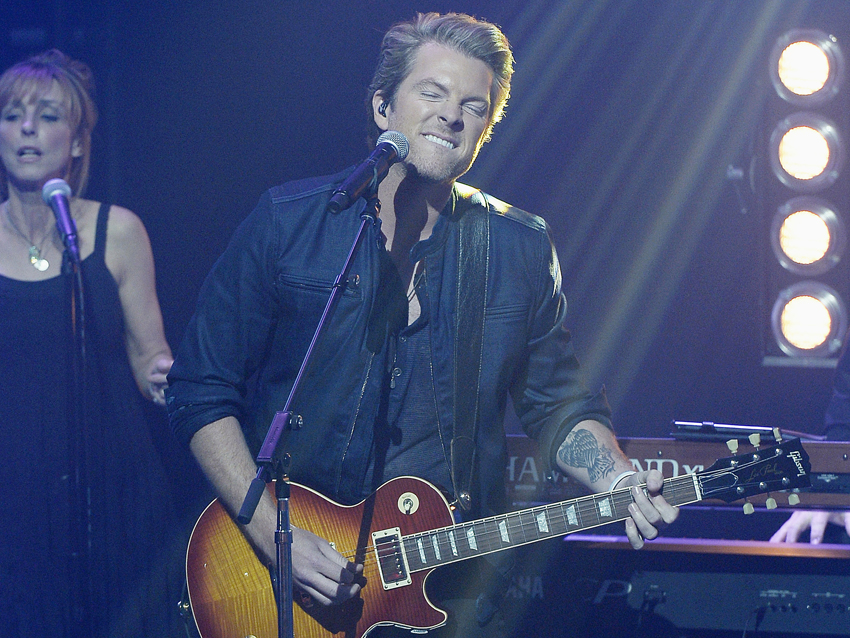
His first time playing a Les Paul
“It’s all about melody, you know? There’s a time to be flashy and play fast, but there’s more times to play simple and beautiful and melodic melodies on lead guitar. Jay is a very good melody and countermelody guy. That’s why we work so well together with our harmonies and singing with Gary.
“We love the Beach Boys and groups like that, that have always had phenomenal countermelodies. The Beatles were really great at it too, and groups like Boyz II Men back in the ‘90s. We love harmony-based groups like that… It was fun to sit there and just brainstorm with each other. Sometimes Jay would come up with something too. I’d try to find it on the guitar, and we’d just go back and forth. It just makes it so much more fun to make music that way. It’s trying to put a puzzle together and find the missing pieces.”
Your choice of gear plays into that, too. From what I’ve read, it wasn’t your choice to give up the Telecaster you grew up playing; it was stolen after you moved to Nashville. But these days you tend to favor Gibson Les Pauls, Paul Reed Smith models and a few others that have, in the past, been more identified with rock playing than with country. What do you feel like that’s done for your identity as a player?
“When I moved to town, I had a sea foam green Telecaster. It was hideous looking, but it was the first guitar my dad bought for me that was my own personal electric guitar. It was an American Standard Telecaster. I learned everything on a Telecaster. I played Steve Vai stuff on that Telecaster. I played Brent Mason licks on that Telecaster. It was a well-rounded tool. I could use the bridge position pickup. I could use the neck position pickup… I wasn’t a variety guy. I was a simpleton, you know?
“I remember Dann just handing me a Les Paul back in 2002. We were recording a song called Life Is A Highway… I had to fake my way though, but as soon as the tone popped up on the speakers, I could hear that this guitar was a whole different world. The tones that you could pull out were phenomenal, and there’s a bluesiness that happens immediately with me and a Les Paul, that I kinda don’t go to when I’m playing a Telecaster. That kind of infused itself into Rascal Flatts’ music as well. It was a game-changer for me.”
Did you continue to search for other tones?
“I think that because of the Les Paul, and Dann Huff introducing me to that world, understanding that certain songs require a certain electric guitar, that really opened my mind up to thinking differently, thinking more like a session player rather than just a guy who plays live with a band.”
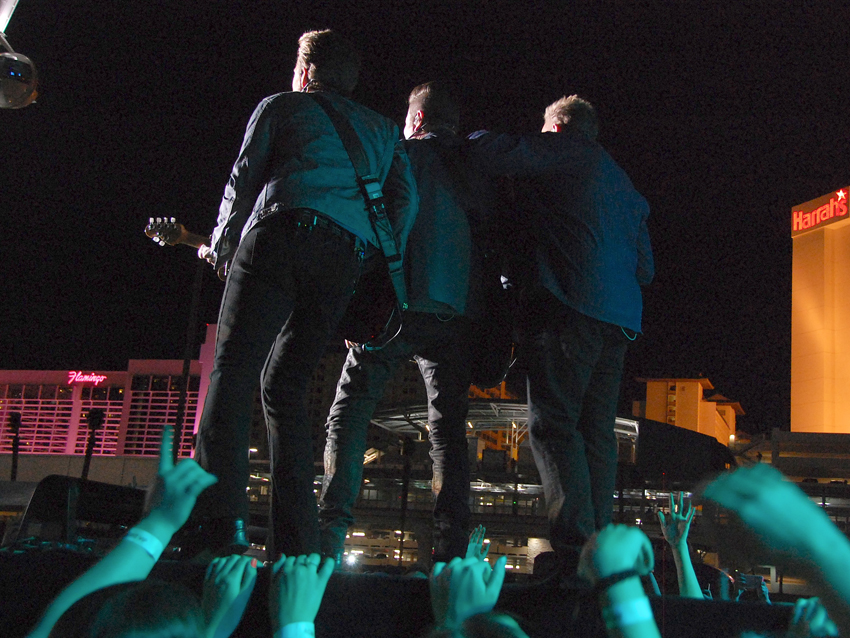
Success
Before you moved to Nashville, did you know there was a difference between being a touring musician and a session player?
“You know, I didn’t know. I didn’t know how Nashville operated yet. I didn’t know there was a tiered system, if you will, of different kinds of players and what different job opportunities there are. There’s road musicians who are fabulous players and great entertainers that really don’t work well in the session role. And there’s guys that are session players that really don’t like to travel. Then there’s the other side of being the artist that travels and plays live and entertains, and jumps in the studio. And I always [saw] myself more in that role.”
You’ve often told the story of how Dann Huff went to bat for you and Jay to play on the third Rascal Flatts album, and you’ve been on their ever since. Besides that, the three of you found each other and formed a band on your own, as opposed to being thrown together by a record label. What difference does all of that make to band dynamics, longevity and the way you’re perceived?
“We found each other, like you were saying. We weren’t manufactured. We weren’t put together. Jay and Gary were singing at a little club in Nashville, Tennessee, called Fiddle and Steel Guitar Bar. They had been doing that as a duo for about a year before I met them. I sat in with them one night, and the harmonies just locked in immediately. Every single song that they did that night was right up my alley. They shortly after that asked me to join them and make it a trio. We fell in love for all the right reasons, and I think that’s exactly why we’ve been able to work together so well and work through some tough times.
“It hasn’t been an easy road. Success is not an easy thing. We built this thing from the ground up, together. We’re all CEOs of this company equally. I love the fact, too, that there’s not four of us. I think the majority rules factor is a big deal with a band. When you have an odd number like three, it ends up being a good thing. We’ve been so fortunate and able to do so much, and we’ve recorded music that people have had weddings to, that people have changed their lives because of when they were thinking about suicide.”
Does it seem to mean something to the fans that you’re the ones playing on the recordings?
“I think to some fans it does. I think to some fans it just doesn’t. The majority of our Rascal Flatts fan base just wants to hear their favorite songs, and they don’t care if we wrote those songs or if somebody else wrote those songs. They just know that that song and those lyrics hit them in the heart, and that’s what they want to hear, the way Rascal Flatts does it. The majority of our fans feel that way. There are some that maybe feel like, ‘I wish you guys would write more of the songs yourselves.’ That’s few and far between.
“We write our butts off. We write as much as we can. But at the end of the day, we’ve got to record the best song that hits us in the heart. The thing about Gary LeVox, too, [is that] as soon as he gets in the studio and he’s singing the first chorus on whatever song it is, we instantly know if he’s singing from his heart or not. At the end of the day, I think we are an escape for our fans, and they come to our live shoes and buy our albums because they want to be happy, or they want to feel nostalgia, or they want to share it with their kids, or the kids share it with their moms and dads. That’s pretty cool.”